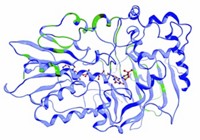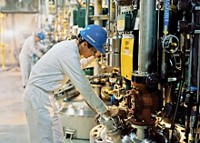Advertisement
Grab your lab coat. Let's get started
Welcome!
Welcome!
Create an account below to get 6 C&EN articles per month, receive newsletters and more - all free.
It seems this is your first time logging in online. Please enter the following information to continue.
As an ACS member you automatically get access to this site. All we need is few more details to create your reading experience.
Not you? Sign in with a different account.
Not you? Sign in with a different account.
ERROR 1
ERROR 1
ERROR 2
ERROR 2
ERROR 2
ERROR 2
ERROR 2
Password and Confirm password must match.
If you have an ACS member number, please enter it here so we can link this account to your membership. (optional)
ERROR 2
ACS values your privacy. By submitting your information, you are gaining access to C&EN and subscribing to our weekly newsletter. We use the information you provide to make your reading experience better, and we will never sell your data to third party members.
Business
Biocatalysis: Custom Manufacturers See Growth In Niche Technology
by Ann M. Thayer
October 25, 2010
| A version of this story appeared in
Volume 88, Issue 43
After getting feedback from potential customers, Codexis has launched new screening kits to make its biocatalysts more accessible for pharmaceutical production. Geared toward process chemists, the kits contain vials of 24 “heavy hitters,” the more commonly used ketoreductase and transaminase enzymes that are likely to be successful in synthetic routes, explained Peter Seufer-Wasserthal, senior vice president for pharmaceuticals.
“These enzymes are good enough to immediately make the first 100 g to 1 kg,” he said, and may not require any further optimization to work well in a scaled-up process. Because the enzymes are commonly used, Codexis has large quantities available.
The company is supplying commercial quantities of enzymes and intermediates to drug company customers and anticipates announcing more deals in the near future. “We always used to have a generic drug pipeline, but now the innovator pipeline is catching up, and we are supplying a good number of intermediates to Phase III drugs,” Seufer-Wasserthal added.
Similarly, Almac has moved from selling enzyme screening kits to offering customized biotransformations that can yield hundreds of kilograms of chiral intermediates. The company looks first to enzymes for scaling up the production of any chiral compounds, according to biocatalysis head Tom Moody. To further support its efforts, Almac is investing $4 million to discover additional biocatalytic approaches that can be rapidly put into play.
Meanwhile, Cambrex acquired the German biocatalyst firm IEP in March to broaden its chiral chemistry offerings. Excited by the prospects IEP brings, Cambrex Chief Executive Officer Steven Klosk expects that his company’s business development expertise should open doors for the new technology. “They have been involved with several commercial products already, and we have signed a long-term licensing deal with a large pharma customer since the acquisition,” he said.
Piramal’s Pharma Solutions business reports that demand has been strong at its Wilton, England-based biocatalysis operation, where the company proactively applies biocatalysis to customer projects, Pharma Solutions Director Gerhard Klement explained. “For every compound, we look very carefully for any benefit from using enzymatic reactions to enhance the productivity and quality.”
Combining biocatalysis with other technologies can make suppliers even more competitive, Seufer-Wasserthal told C&EN. “The enzyme is very often a good part of the process, but it is not the cost driver.” With many ways available to make intermediates, he added, success depends not only on technology, but also on quality, pricing, and being a reliable, approved supplier.




Join the conversation
Contact the reporter
Submit a Letter to the Editor for publication
Engage with us on Twitter